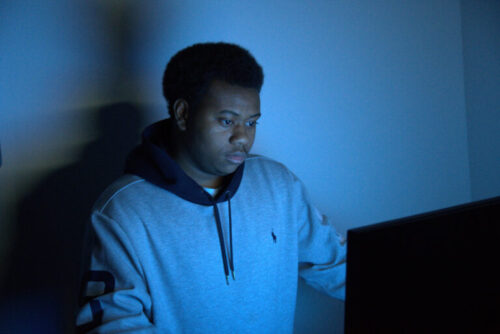
Sidney Garrison, a junior and psychology major at WCU, sits at his desk with his computer screen reflecting on his face as he exhaustedly applies for internships.
“Almost every single day I felt just tired and exhausted. I’m trying my best to make it through the semester,” Garrison said.
As the semester progresses many students are feeling burnout. During the spring semester WCU has two breaks – a week off in March for spring break and three days during the Easter holiday. But are they enough to keep people from getting overwhelmed.
A study done by the National Institute of Health in 2023 found that 59.9% of college students experience burnout in their college career.
“Burnout is the result of various experiences for people in their work or school environments – if we have lots of demands on our time, then that lends itself more to the experience of burnout,” said Annie Wilson, assistant professor of psychology at WCU.
Garrison a member of Greek life on campus says that having that demand on his time often leaves him feeling tired, affecting his ability to apply for internships.
“Looking at an internship application is so hard for me. Like, I need to go to my advisor and ask her for help on understanding the internship application,” Garrison said.
Veronica Newsome, graduate from the Communication Department in 2024, had some similar experiences.
“I experienced a lot of burnout my junior year of college where I was doing the most intense stuff all at once,” Newsome said. That year she was taking 18 credit hours per semester of production based classes, working 15-20 hours a week on top of being in WHEE-TV, the schools broadcasting club.
Newsome was working so much that she had no time to rest or enjoy what she was doing.

“Burnout for me happens when I’m not enjoying what I’m doing, and I feel like it’s just trudging on day to day to day,” Newsome said
While her junior year was the most intense year of her college experience, Newsome says all four of her years took a toll on her.
“After graduation, I was so exhausted from the last four years that I didn’t do anything for three straight weeks,” Newsome said.
Much like Garrison, Newsome also had problems when applying for jobs.
“It was really challenging to apply for jobs while being in school. I wasn’t able to commit fully to the job application process,” Newsome said.
While being burnout affected both Garrison and Newsome, it’s not necessarily an indicator that everyone will feel this way. Wilson says that different indicators contribute to how people deal with stress.
“People who are highly neurotic kind of naturally they worry a lot, they stress a lot, they’re concerned with worst case scenarios, things like that. Tend to experience more burnout in school and in their careers,” Wilson said.
Wilson explains that the more someone worries about other things on top of schoolwork the more they will experience burnout.
“Things like practicing gratitude and mindfulness, being present in the moment and thinking about everything that you do have. I think those are things that we can practice individually that are evidence based, that reduce stress and anxiety and negative effects,” Wilson added.
While Wilson provides advice on how to combat stress, WCU has the breaks during the semester that provide students and staff with a small outlet to rest. If that is not enough they can always seek help at Counseling and Psychological services.
As Garrison continues to apply for internships and anxiously wait for results, there is hope he’ll take some of his own advice.
“Take a step back and worry about yourself, pull yourself together, because at the end of the day, if you’re burnt out, it’s better to take time for yourself and help yourself mentally than to just keep pushing yourself through everything,” Garrison said.



